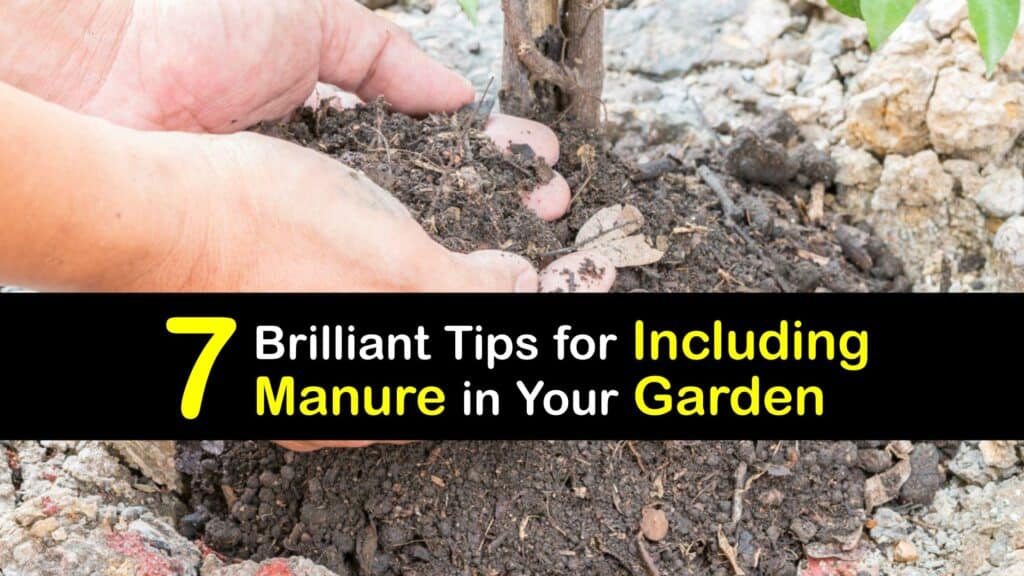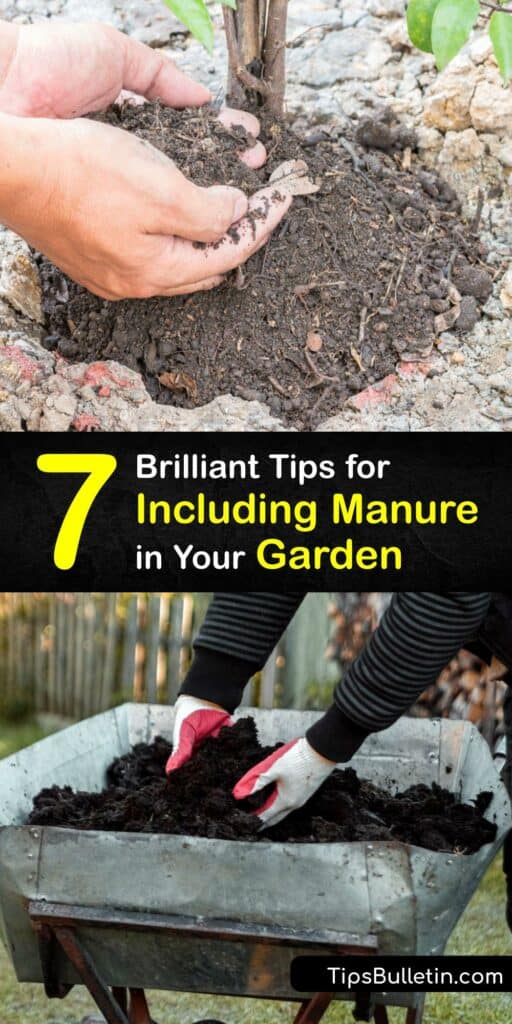There’s a reason groundskeepers use animal waste in mulch for landscaping projects. Although manure may not sound appealing, it is a highly nutritious material for plants to help them grow. As a naturally recurring product of owning livestock, learn how to apply manure to plants in your garden.
There are numerous sources of manure to use in the home garden. Horse manure is a favorite for many gardeners; other choices include rabbits and chickens. Animals that do not consume meat are the best options for gathering manure to avoid harming your plants.
Using animal manure in the vegetable garden comes with various benefits. Animal manure is packed with nutrients like nitrogen for healthy plant growth. Finding out how to apply and amend your soil with manure is necessary for making the most out of the manure on your property. Continue reading for tips on composting horse manure, applying manure to your garden, and any potential risks in using animal manure to feed plants.

How Does Manure Help Plants?
Nitrogen, potassium, and phosphorus are three primary plant nutrients your garden needs to thrive. Animal manure made from cow and goat dung contains all these nutrients. When properly applied, waste takes the place of expensive synthetic fertilizers that may not give your garden nutrients over a long period.
Keep reading for tips on how to successfully use alpaca manure fertilizer in your garden and to find answers to common questions like, “Will composted manure burn plants?”
What is the Best Manure for Plants?
Although various types of manure benefit your garden, some manure sources may be easier to come by depending on where you live. The smell of the waste is another determining factor in deciding which manure to introduce to your gardening routine.

Fresh cow manure is likely the first thing you think of when considering “Is manure good for plants?” While it is often the most available option, it has a mild nutrient balance. However, horse and steer manure overshadow its potency.
Chicken manure is an excellent nitrogen source; it composts quickly compared to the waste of larger animals. Poultry manure is twice as rich as steer or cow manure. Rabbit pellets are a favorite choice for gardeners in urban areas because they have the weakest smell among animal manure. There are several ways to make rabbit manure compost, just like other types of manure. It depend on your available space and the time you want to spend.
Can You Use Raw Manure on Plants?
Although there are various ways to use manure in your garden, ensuring that your application method is safe is crucial. Fresh manure contains salt, and plants growing in soil with a high salt content are at risk of burning.
Adding too much salt to the soil and over-fertilizing can lead to burning plants. An excessive amount of salt draws moisture from plant roots, and plants experience root damage. Without proper care, your plant becomes discolored and begins to die.
How to Make Manure Compost
Fresh manure is excellent for a decomposing compost pile. Fresh chicken manure is a great choice for composting at home because it is easier to work with than fresh horse manure.
Adding manure to your compost pile, like when you dispose of chicken poop, encourages the activity of the microorganisms that thrive in compost piles to aid with the decomposition of organic matter.
Chicken manure is a green compost material. You can also use organic cow manure compost. Add enough brown materials like dried leaves and twigs to balance the nitrogen that animal manure adds to your compost.
Note: When adding manure to your compost pile, inspect the chicken manure for the weed seeds of invasive plants that may damage your garden.
How to Apply Manure to Plants as Mulch
One of the benefits of using manure as a fertilizer for your garden is that it acts as a slow-release fertilizer. Compared to commercial or synthetic fertilizers, the advantages of composted fertilizer last over several growing seasons.
Like green manure, which helps soil structure and prevents the leaching of nutrients in the soil, composted manure acts as mulch. Composted manure is commonly used for landscaping projects or on top of potting soil for outdoor container plants. Using manure in your garden benefits the soil and helps produce lush plants.
Making Manure Tea
One popular method of using manure in the garden is to create a liquid fertilizer from waste, also known as manure tea. The process involves soaking animal manure in water to draw out the nutrients in the waste, follow our manure tea recipe here. Once the manure steeps, dilute the water and add the manure tea to your garden as part of your regular watering routine.
Fill a five-gallon bucket with water and let it sit for a day to become non-chlorinated. Line a bucket with an old pillowcase or a similar porous material. Add the manure to the non-chlorinated water.
Cover the manure bucket and let the water sit for two days, stirring occasionally. Once the manure steeps, pull the bag out and strain the water. Add pure water to the bucket until the manure tea is light brown.
Soil Amendment With Manure
How does manure help plants? One of the best methods for using manure for plant growth happens before your plants even get into the ground. If you’ve cleared your garden of debris at the end of fall and are plotting spaces for the spring growing season, this is the perfect time to use organic manure.
Tilling manure as an organic fertilizer into your garden gives the manure plenty of time to break down before spring. If you can’t make manure compost, incorporating it into your garden soil is the perfect way to avoid burning plants.
Will Composted Manure Burn Plants?
To avoid burning your plants through manure applications, one of the best ways to apply manure is by composting it before it reaches your vegetable garden. Composting organic material involves heat produced from decomposition to break down matter and kill parasite eggs inside animal manure.
Composted chicken manure is safer than fresh manure because harmful pathogens die in the heat. The salt that threatens plant roots is no longer a threat to plants.
What to Avoid When Using Manure for Plants
Although most manure is beneficial for the growth of your garden, not all animal waste creates the perfect harvest. Dog and cat waste are the easiest to come by, but the manure from these animals is terrible for the garden since they often carry unknown parasites.
The risk of pathogens and parasites extends to meat-eating animals like pigs and other carnivores. Although composting manure helps create safe aged manure, the harmful pathogens in specific manure cannot be composted away. They may infect humans who consume food from the garden treated with this manure.
One of the most significant risks to humans is E Coli. If the bacteria is present in manure used to grow crops, it remains for more than 100 days (..).
How does manure help plants? The advantages of using manure in your garden come from the nutrients in the food animals eat and leave in their waste. Although manure is an organic solution to providing your plants with nutrients, manure may harm your plants without proper planning.

If we helped you learn how to apply manure to plants, please share our advice on using manure with your friends to answer questions like, “Will composted manure burn plants?” on Facebook and Pinterest.